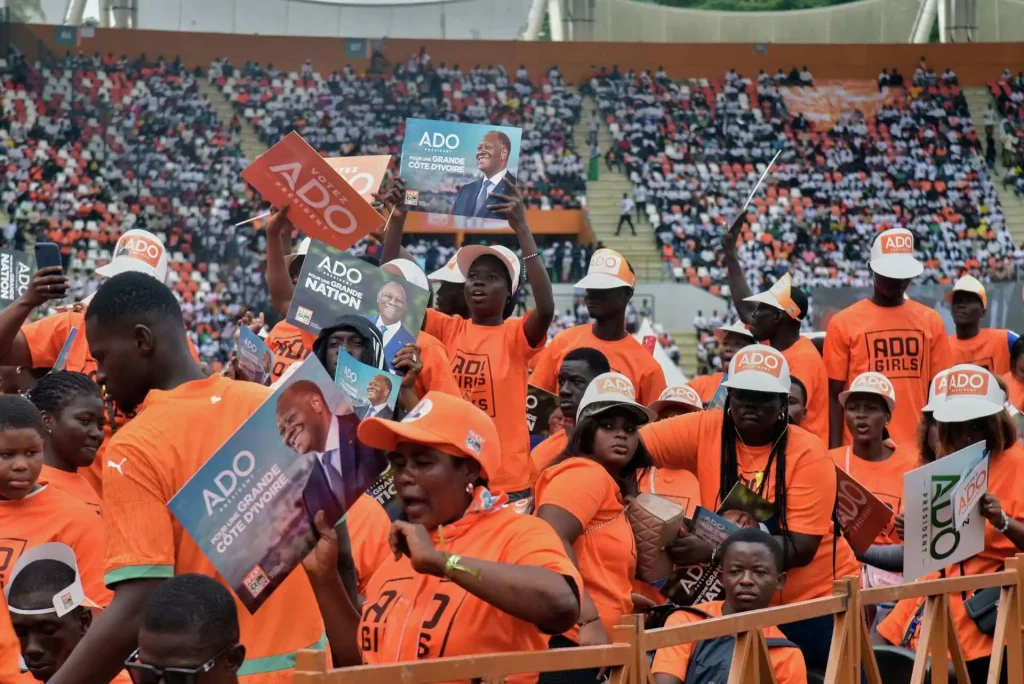Ivory Coast’s President Alassane Ouattara is making a heartfelt plea to the nation’s 32 million people, especially its vibrant youth, to turn out in force for the October 25, 2025, presidential election.
At a massive rally in Abidjan’s Félix Houphouët-Boigny Stadium on October 18, the 83-year-old leader positioned himself as the champion of young Ivorians, promising jobs, security, and prosperity. “Your vote is your power use it to shape our future,” he urged, his words echoing amid chants and flags.
With 8.7 million registered voters, turnout could decide if Ouattara secures a fourth term in this West African economic powerhouse.
But beneath the cheers, shadows loom opposition bans and protest crackdowns have turned the campaign into a high-stakes drama.
Ouattara’s Youth Focus
Ouattara, a fixture since 2011, highlighted his track record: booming infrastructure, surging growth, and investments in education and tech. “I’m the one who fights for you,” he told the crowd, pointing to new roads and schools as proof.
His message resonates with a generation facing unemployment and inequality, but critics say his government falls short. The rally, packed with supporters waving posters, was a show of strength, but the real test comes at the polls.
Ouattara faces four challengers, but the field is uneven, with major opposition sidelined.
Opposition Locked Out
The election’s drama peaked when key rivals were barred. Former President Laurent Gbagbo, 80, and Tidjane Thiam, 63, a former Credit Suisse CEO, were disqualified, sparking fury. A court ruled Thiam’s dual Ivorian-French citizenship ineligible, while Gbagbo’s past conviction blocked him.
The four remaining candidates Simone Gbagbo, Jean-Louis Billon, Ahoua Don Mello, and Henriette Lagou form loose coalitions without major party backing, limiting their reach, experts say.
The bans have fueled cries of foul play, with opposition claiming the move clears Ouattara’s path.
Protests and Crackdowns
Tensions boiled over. Youth-led protests erupted in September, demanding Ouattara step down, met with a harsh response: hundreds arrested, some jailed. In October, the government banned all demonstrations, citing stability fears.
Security raided opposition homes without warrants, escalating rhetoric. Community leader Edmond Gbogbo praised Ouattara as a “father who keeps promises,” but activists like Cesar Flan Moquet from the Centre of Political Research warn the crackdown undermines trust.
The streets of Abidjan hum with unrest, as 8.7 million voters weigh their choices.
A Legacy Under Scrutiny
Ouattara’s 2016 constitutional change scrapped term limits, drawing ire. His 2020 re-election, boycotted by opposition, was controversial. Supporters tout economic booms and projects like a 300-meter tower, but critics slam inequality and unmet promises.
Paul Melly from Chatham House notes West Africa’s trend of long-term leaders clashing with youth, adding urgency to the vote.
As November nears, communities demand dialogue to ease tensions and ensure peace.
The Youth’s Voice
Ouattara’s youth call is strategic half of Ivory Coast’s population is under 18. Yet, with bans and bans on protests, many feel disenfranchised. Thiam and Gbagbo’s exclusion has splintered opposition, leaving four candidates in makeshift coalitions.
Simone Gbagbo, Laurent’s ex-wife, draws from his base, while Billon and others push economic reforms. The vote’s outcome could either solidify Ouattara’s reign or ignite calls for change.
The world watches this cocoa giant, where stability hangs by a thread.
A Nation on Edge
Ivory Coast’s election is a powder keg. Ouattara’s rally pumped up supporters, but bans and arrests have fueled resentment. With 8.7 million voters, turnout could tip the scales. Will youth heed his call, or demand more?
As November looms, Abidjan’s streets simmer, and the global spotlight intensifies. Ivory Coast stands at a crossroads peace or protest? The answer lies in the hands of its people.



















